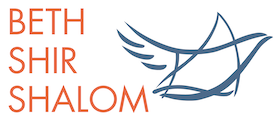MAY 5, 2021 By RABBI ALEX KRESS
During the pandemic, I had a serious mental health breakdown and no one knew. Perhaps I seemed a little off or distant to my loved ones and coworkers, but the depth of my sorrowful disorientation remained mostly hidden to the outside world.
Back on more stable ground, for now, I realize how much the still unraveling experience has opened within me access to new channels of empathy and understanding. The expression, “Be kind, for everyone is going through something you know nothing about,” has always resonated with me, but the trauma of the pandemic brought that lesson home in a profound way.
Poet Rudy Francisco writes:
Sometimes I’m the mess
Sometimes I’m the broom–
On my hardest days,
I have to be both.
Covid-19 has brought on my hardest days, forcing me to be both mess and broom.
In Parshat Balak, we read the farcical story of Balaam and his talking donkey. Balak, the Moabite king, hires the seer Balaam to curse the Israelites, whom he views as a growing threat. As Balaam sets out on his journey, God becomes irate and sends an angel to stand in front of the envoy’s donkey. Though Balaam fails to see the angel, the donkey does and swerves around it. Balaam beats the animal for reacting to something he cannot see. It happens again, and the donkey squeezes along the wall, painfully pinning Balaam’s foot. Balaam strikes the donkey again. The third time the donkey sees the angel of God, she lays down with Balaam on her back, at which point he becomes furious and hits her with a stick yet again. God finally intervenes, opening the donkey’s mouth to defend herself and then opening Balaam’s eyes to the presence of the angel. Balaam then says, “I erred because I did not know…” (Numbers 22:34).
So often we err because we do not know. We judge and gossip before ever attempting to react with kindness or understanding. The sin of Balaam is not his inability to see the invisible but to assume he knows it all and react violently. The medieval commentator Rashi adds that the acknowledgment of error was a disgrace for Balaam “because he used to boast that he knew the will of the Most High (24:16) and now his own mouth bore testimony: ‘I did not know’” (Midrash Tanchuma, Balak 1). When we pretend to know the inner workings of others, we assume to know the intricacies of God’s creatures, setting ourselves up to have to confess, “I erred because I did not know.”
Instead, we must recognize our agency in every situation and the harm that can be inflicted by claiming ignorance after acting carelessly. All of us have played both the role of Balaam and the role of the donkey. Like Balaam, we are all guilty of doing something harmful because we did not know or understand the situation or consequences. We judge based on perfect Instagram feeds instead of recognizing the inherent messiness of human life. Other times we are like the donkey, dealing with something no one else can see or understand and often receiving harsh judgment in return. When we truly understand that life is always more complicated than what most people publicly project, we begin to recognize the value and impact of acting thoughtfully and compassionately in the first instance of every action and interaction.
When Prince Harry and Meghan Markle broke from the royal family and aired their pain publicly, they shattered the pristine image many outsiders had of royal life. The public fixation with the royal family has always invited grandiose assumptions of what their lives are like as seen through the prism of endless media messaging. Yet, no one on the outside can understand the vulnerabilities we do not see. We make assumptions about other people when we are able to see and understand just a fraction of their experiences. The private stressors and traumas we carry affect us profoundly, and we all must learn to replace our reflex to judge with a reflex to show compassion.
Rabbi Abraham Joshua Heschel reflects: “When I was young, I used to admire intelligent people; as I grow older, I admire kind people.” I still admire intelligent people, but perhaps Heschel is correct; it’s the kind people we should aspire to emulate.
